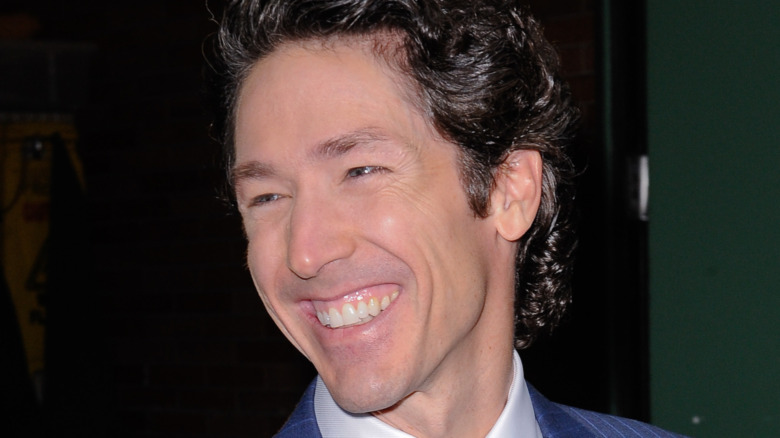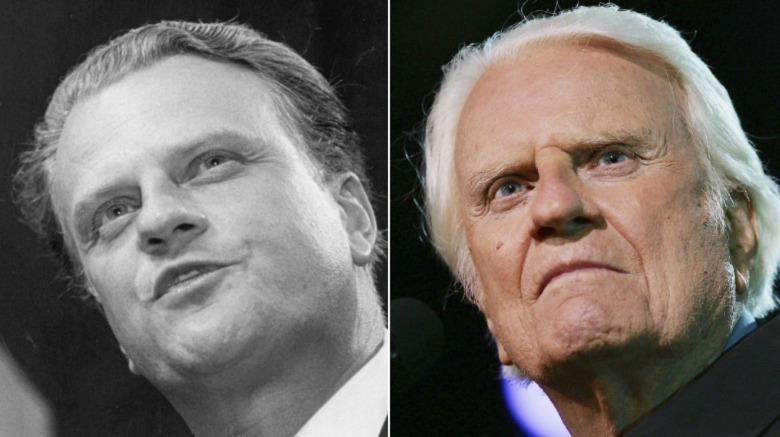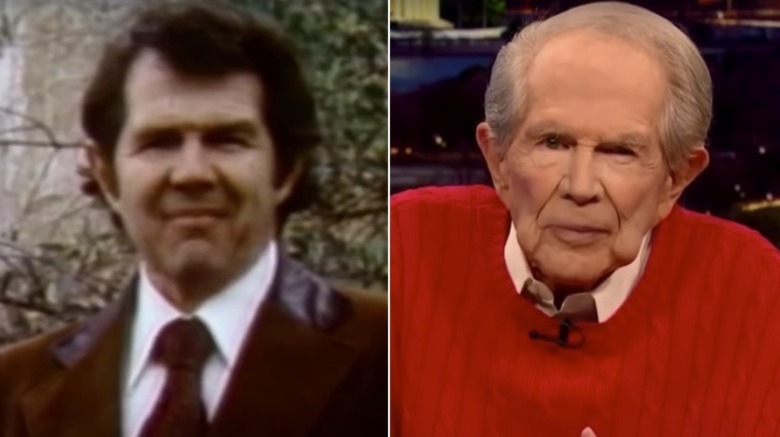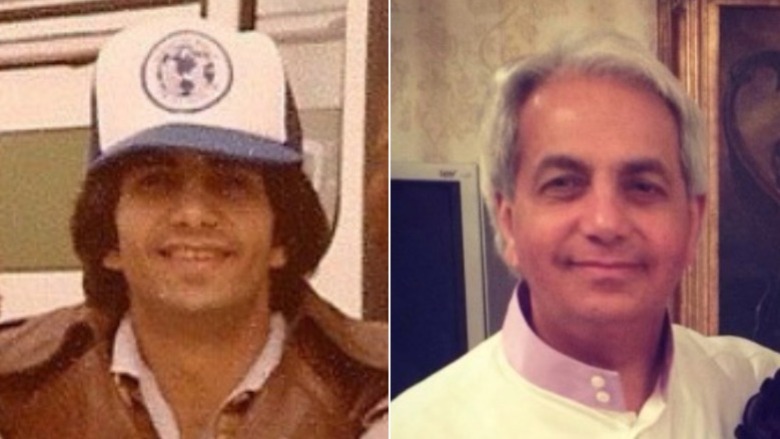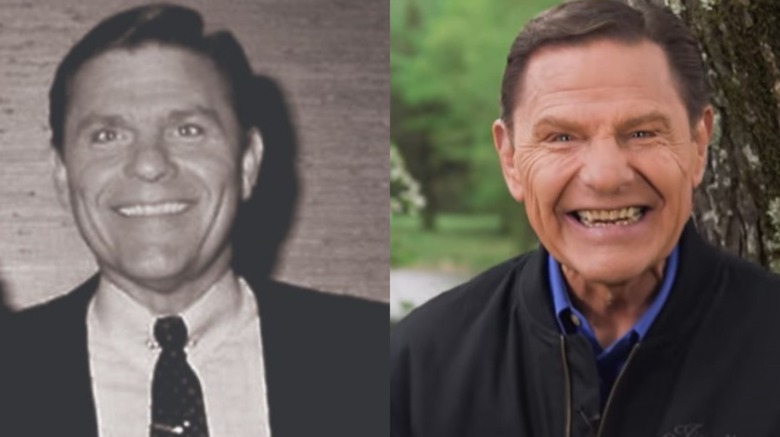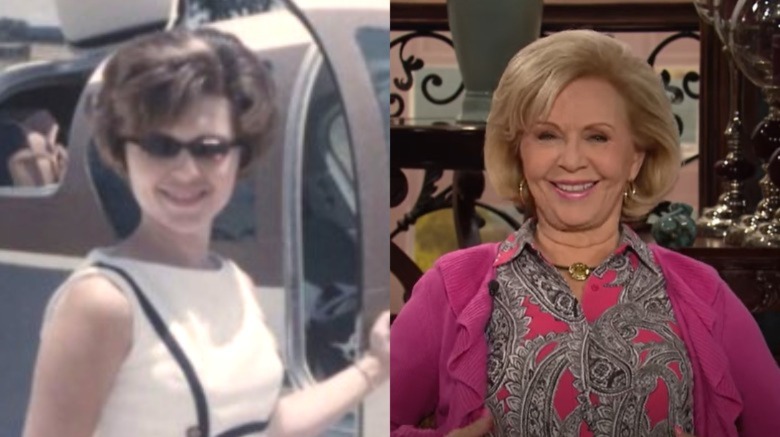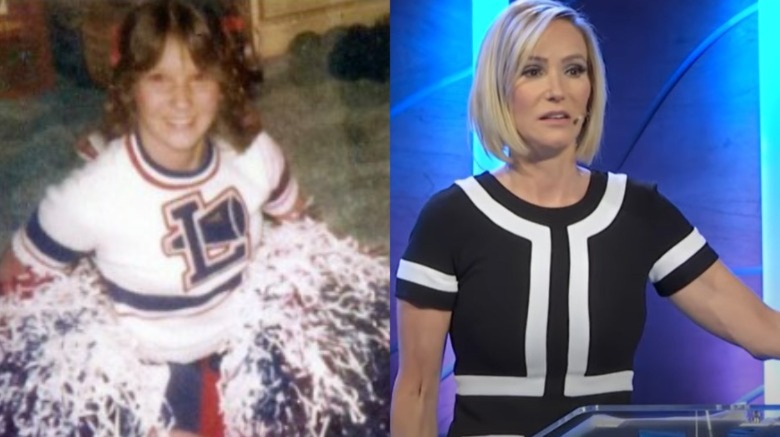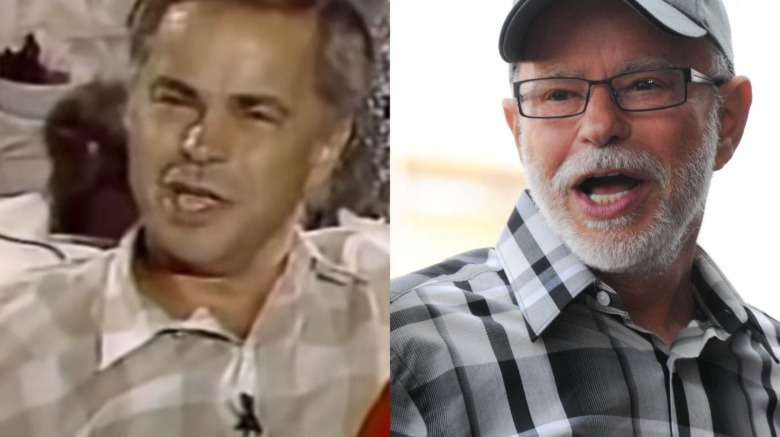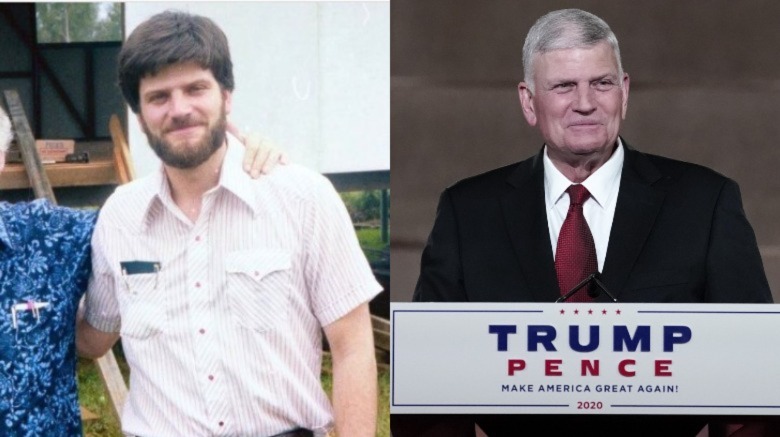What These Televangelists Looked Like Before The Fame
The following article contains references to sexual assault allegations and abuse.
Any American child who has been left home sick from school with nothing to keep them company but chicken noodle soup and daytime TV has probably stumbled upon an episode of "The 700 Club" or a high-energy infomercial selling blessed water. Ever since the days of old-school tent revivals, Americans have been enamored with the big business of evangelism — even more so since the first radio stations made it possible for preachers to get their message out to a larger audience.
Televangelism began to boom in the 1960s when FCC deregulations "freed radio and television stations from a requirement that it give away air time as a public service, ramping up the media's commercialization," which grew evangelist programming viewership from "about 5 million to almost 25 million" between the 1960s and 1980s, according to Jstor Daily. Preaching on TV — and now YouTube, in the days of cable-cutting — brings in copious amounts of cash every year, and the industry has not slowed down. Televangelism's biggest stars and more famous than ever, often raking in six-figure salaries and multi-million dollar book deals (via Sapling).
But what did these Jesus Christ superstars do before they made it big? Every television preacher had a different life — and sometimes a different hairdo — before they became household names. For some, evangelism is a family business — but the pre-fame lives of others may surprise you.
Billy Graham was born to preach
Billy Graham's career as one of the most famous evangelists ever began after World War II. CNN describes Graham as "the skinny preacher with the booming voice who crisscrossed the country leading evangelistic crusades" who was already the president of a college at the age of 30. And then, while on a long hike at a Christian retreat center, he had an aha moment.
As religious history professor Randall Ballmer told CNN, Graham "decided to simply preach the Gospel and not worry about the intellectual challenges of the faith." CNN writes that a 1949 crusade in Los Angeles, held in a tent dubbed the "Canvas Cathedral," brought a handful of public figures into Graham's corner, and catapulted him into fame when newspaper owner William Randolph Hearst instructed his papers to "Puff Graham" — which suddenly put Graham's message in the headlines of some of the largest papers in America.
From there, Graham's ministry came to influence even the most powerful circles of American society. The New York Times detailed in Graham's obituary his close relationship with the White House and his unofficial role as "national clergyman." Although Graham's career was not totally without controversy, the outlet reported that his image remained "untarnished by the kind of sex and money" that could end his career by "maintaining fiscal integrity and personal probity" until his death in 2018.
Joel Osteen worked behind the scenes
Those who knew Joel Osteen, pastor of the Houston-based Lakewood Church, before he became one of the most important figures in the modern evangelical movement say they never thought he'd take to the pulpit. According to the Houston Chronicle, Joel was a "shy and private" college dropout who preferred to be behind the camera. Following a quick stint at Oral Roberts University, Joel returned to Houston because he, as the Houston Chronicle explains, "felt God's calling to help his father start his own TV ministry by editing Lakewood sermons for television." In 1987, Joel married Victoria Osteen, who would become an integral part of Joel's future ministry.
The Houston Chronicle reports that around the time of Joel's father's death, Joel started to fill in for the elder Osteen — even though he never intended on taking over the evangelist empire. Joel tried to cancel Lakewood's television show, but Victoria convinced him to restart the program. Joel and Victoria Osteen quickly turned Lakewood into a bonafide megachurch, increasing the church's revenue to $89 million by 2017, according to the Houston Chronicle. The outlet also notes that while Joel and Victoria no longer take a salary from the church — they do quite well thanks to book sales — their popularity has earned them a $12 million dollar home in an upscale part of Houston.
Pat Robertson was a military man
Before Robertson was one of the most influential religious leaders in America, he was a high-achieving military prep student from Chattanooga, Tennessee. According to Regent University, which he founded, Robertson enlisted in the Marine Corps while still in college and served in Korea before earning his law degree at Yale and his Master of Divinity degree from the New York Theological Seminary. He then founded the first Christian TV network, the Christian Broadcasting Network (CBN), in 1960. According to CBN, the network's flagship program, "The 700 Club," began as a telethon program in 1963, where Robertson "asked 700 viewers to pledge $10 a month" to keep the network afloat.
Robertson grew "The 700 Club" into a cornerstone of the religious right. Terry Heaton, a former producer of the show, told Vox that the program became increasingly political in the '80s and '90s, claiming the goal of the series was to "restore the USA to a godly nation." This ultimately led to Robertson's attempt — and failure — to run for president in 1988. According to The New York Times, Robertson stated on "The 700 Club" that "only Christians and Jews were qualified to govern," a statement he would eventually try to walk back. Years later, Robertson became a staunch defender of Donald Trump, claiming that "whoever is 'revolting' against Trump is 'revolting against what God's plan is for America'" — although once the time came for Trump to accept defeat, Robertson announced that it was time for the president to "move on" (via CNN).
Benny Hinn claims he was healed by faith
According to his official website, Israeli televangelist Benny Hinn "surrendered his heart and life to Jesus Christ" as a high school student in 1972. The ministry claims that his decision to become a preacher came after prayer cured his stutter, and he began preaching full-time at age 22 in 1974. He is perhaps most well-known for his often-televised "faith healings," where he claims to heal followers of ailments and impairments. These healing attempts have landed him in plenty of hot water; William Vandenkolk, who claims Benny Hinn publicly "healed" him of blindness when he was nine, spoke out at the age of 25 to reveal that he was "not healed" and "never saw" the money the church reportedly raised for his family (via WFAA 8 ABC).
Benny Hinn is also one of the leading figures of the "prosperity gospel" movement, which Christianity Today describes as "teaching that God rewards active faith with health and wealth." Christianity Today reports that although he once performed stunts like "promising God will give material blessings in exchange for a gift of $1,000," the televangelist now believes that "the blessings of God are not for sale." In 2010, he drummed up more controversy when he reportedly became romantically involved with fellow televangelist Paula White-Cain, according to the Toronto Star. Around that time his wife, Suzanne Hinn, filed for divorce, but they eventually reconciled.
Kenneth Copeland was 'almost the next Elvis Presley'
In his early years, 20-year-old Kenneth Copeland was, in the words of his ministry, "almost the next Elvis Presley" whose 1957 record "Pledge of Love" earned him a gold record. On his record release day, Kenneth was drafted into the Army, which he claims was an act of God in order to protect him from the "kind of success" that would have "destroyed" him. The U.S. Sun writes that Kenneth was married two times, first in 1955, then again in 1958, before he married Gloria Copeland in 1963.
According to Kenneth Copeland Ministries, Kenneth and Gloria Copeland kicked off their ministry work in 1966, when Kenneth attended Oral Roberts University. During an evening of prayer and introspection, he felt a calling that prompted him to become a preacher.
Nowadays, the Copelands head an enormous ministry based in Texas that boasts "a church, private airstrip, a hangar for the ministry's aircraft, and a $6 million, church-own mansion," according to The Ledger. According to NBC News, the Copelands preach the "prosperity gospel," and have come under scrutiny for "improperly" benefitting from the ministry's profits — but as The Kansas City Star noted, that didn't stop them from buying Tyler Perry's jet in 2018.
Gloria Copeland was a flying ace
Kenneth Copeland's third wife, Gloria Copeland, is a famous televangelist in her own right. According to The U.S. Sun, Gloria married Kenneth in 1963 after his divorce from his second wife, and the couple now have three kids. In a "fun fact" page posted on their website, Kenneth Copeland Ministries revealed that Gloria was a high school cheerleader in Jacksonville, Arkansas for the "Red Devils." On the site, she says she's "switched teams" since, adding, "I'm cheering for Jesus!" The same article states that Gloria became a pilot in the 1970s when she and Kenneth bought a jet for business purposes but realized he couldn't fly it by himself. Gloria passed her check ride with an "Excellent" rating but eventually stopped flying. However, she'll apparently still "come up front and read charts for the pilots" when needed.
Gloria made headlines in 2018 for telling viewers that influenza could be avoided by believing in Jesus. "We've got a duck season, a deer season, but we don't have a flu season ... [Jesus] redeemed us from the curse of the flu," she said (via USA Today). That particular message set off the media — one Dallas Observer op-ed even made the convincing case that Gloria's use of an incantation to ward off the flu means she is literally a witch — but Gloria's die-hard followers still believe she speaks the truth.
Paula White-Cain's had a troubled childhood
You may have heard of this "prosperity gospel" preacher. Paula White-Cain famously served as an advisor to President Trump, where she led the "Faith and Opportunity Initiative," a program that, according to The New York Times, "aims to give religious groups more of a voice in government programs devoted to issues like defending religious liberty and fighting poverty."
White-Cain, who added "Cain” to her name after marrying Journey keyboardist Jonathan Cain, had a difficult upbringing. As noted by the Orlando Weekly, the preacher's story is one of abuse and addiction, and loss. Despite this, the religious leader — sometimes referred to as "Dr. White" despite having no formal education — managed to build an empire enormous enough to land her a spot in the White House.
According to Orlando Weekly, White-Cain's preaching methods include speaking in tongues and "faith healing," a controversial practice where preachers claim to heal the sick using God's word. She also reportedly makes $40 million per year from the televised broadcast of her sermons at Without Walls International Church, which boasts a "racially diverse congregation" of 28,000 people. Although she has plenty of fans, many critics echo the words of Ole Anthony, who runs a religious watchdog organization. "Paula represents everything that is wrong with American religion," Anthony said in the Orlando Weekly. "She's left a trail of destroyed churches behind her."
If you or anyone you know is struggling with addiction issues, help is available. Visit the Substance Abuse and Mental Health Services Administration website or contact SAMHSA's National Helpline at 1-800-662-HELP (4357).
If you or someone you know is dealing with domestic abuse, you can call the National Domestic Violence Hotline at 1−800−799−7233. You can also find more information, resources, and support at their website.
Jim Bakker spun records for school dances
There have been several iterations of disgraced televangelist Jim Bakker's questionable career. But before he was selling disaster-proof chowder in ten-gallon quantities, Bakker was a "slight, shy son of a factory worker" who was "forbidden from dancing by his strict fundamentalist religion," according to The New York Times. Instead of dancing, Bakker "became the disk jockey at school sock hops," sparking his interest in a media career.
In 1972, Jim and his then-wife, Tammy Faye Bakker, started the show "The PTL Club." Together, they became some of the most well-known televangelists in the country, even creating a massive Christian theme park called Heritage USA, according to Belleville News-Democrat. According to ABC, their demise included financial scandals, "hush money," and a sexual assault accusation that Jim later denied in his book "I Was Wrong."
Younger generations know him for his end-times gear and fake cures — most recently, Jim and his new wife, Lori Bakker, were seen hocking "Silver Solution," which his show claimed would "deactivate" the coronavirus, a stunt that NPR reports he was sued for. And if a paint bucket of slop is more your speed, Jim has you covered with his "Survival Buckets." Don't worry, NPR tried them all so you don't have to.
If you or anyone you know has been a victim of sexual assault, help is available. Visit the Rape, Abuse & Incest National Network website or contact RAINN's National Helpline at 1-800-656-HOPE (4673).
Franklin Graham was a bad-boy biker
According to The Washington Post, Franklin Graham was raised primarily by his mother as his superstar evangelist father Billy Graham was often traveling for his ministry. Franklin, who was "always a handful," was sent to boarding school along with the rest of his siblings at a young age.
While it may not have come as a surprise to the public that he decided to carry on with his father's ministry, Franklin himself never thought that he would walk in Billy's footsteps. In a 2012 CBS News interview, Franklin said that he "wanted to be a hell raiser"; as CBS put it, "he was attracted not to the gospel, but to guns and motorcycles, cigarettes and alcohol." Franklin recalled the ultimatum his father gave him: "Either you're going to have to accept Jesus Christ and what he says and obey him and follow him, or you'll have to reject him."
Today, Franklin runs the Billy Graham Evangelistic Association and charity Samaritan's Purse. Describing the differences between his charitable work and his political views, The Atlantic writes that Franklin "represents in one person the best impulses of Christianity and the contradictions that have confused many Americans about what white evangelicalism stands for." However, Politico puts it significantly more bluntly: "[Franklin] is—not to put too fine a point on it—political hack, one who is rapidly rebranding evangelicalism as a belief system marked not by faith, hope, and love but by fear of Muslims and homophobia."

